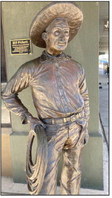During an era of intense racial discrimination and segregation, legendary African American Taylor resident and cowboy Bill Pickett became famous for inventing a popular rodeo sport, becoming a movie star and performing for British royalty.
But those are not the only reasons his greatgreat- nephew, District 1 Councilman Gerald Anderson, admires his iconic ancestor. “He was big into helping people,” said Anderson, the executive director of the Bill Pickett Educational Foundation, a 501(c)(3) nonprofit that provides education and enrichment opportunities for area youth.
“He was a family man. He was a Christian. He actually used to hold services in our home for The First Baptist Church (of Taylor) when they didn’t have their parishioner hall. So Bill Pickett was one of their first deacons,” Anderson added.
Pickett was born near Liberty Hill, the second of 13 children to former slaves Thomas and Mary Gilbert Pickett in 1870, according to Elaine Landau in her book “Bill Pickett: Wild West Cowboy.” Landau said Pickett invented the art of bulldogging, or steer wrestling, by watching cattle dogs retrieve loose steers on area ranches.
“These dogs were trained to grab hold of a steer’s lip with their teeth,” Landau wrote.
“The pain made the steer stop struggling. Once the animal was quiet, a cowboy would rope it. (Pickett) thought that if a dog could control a steer that way, so could he. … He tried on a few strays and was not surprised when it worked.” By the late 1880s, Picket and his family were living in Taylor, and Pickett had become a cowboy himself, learning to rope steers and tame wild horses. Soon after, he and his brothers formed a horse-breaking company, and they began entering bronco-riding contests.
Pickett quickly became the crowd’s favorite with his bulldogging performances at the Taylor town fair, and then in neighboring towns, Landau said.
“Before Bill Pickett arrived, no rodeo cowboy had ever thrown a full-grown steer to the ground,” Landau said. “But Pickett would make bulldogging or steer wrestling an exciting rodeo event. … The crowds admired his bravery in handling steers.”
In 1905, Pickett joined the 101 Ranch Wild West Show, through which he toured all over the world with Will Rogers, Buffalo Bill Cody and other celebrities, taking on the moniker “Dusky Demon.”
According to Cecil Johnson in his biography “Guts: Legendary Black Rodeo Cowboy Bill Pickett,” the rodeo star was often not identified as an African American due to segregation.
“Many prejudiced cowboys did not cotton to the idea of competing against or being on the same program as a Black man,” Johnson wrote. “And in some places, participation in such events by Blacks was officially or unofficially banned.”
Nevertheless, Anderson said Pickett was able to transcend racial barriers and even had the opportunity to perform in front of the king and queen of the United Kingdom in 1915 and star as himself in the 1921 movie “The Bulldogger.”
“Bill Pickett was actually the first Black person to be allowed to ride in a passenger car from Cheyenne, Wyoming, because Blacks had to ride in cattle cars,” Anderson said. “And after he performed in Cheyenne, Wyoming, he was allowed to return in the car with the people and not have to ride with the cattle.”
Though Anderson never got a chance to meet his great-great uncle –– Pickett died in 1932 after being kicked in the head by a bronco — his late grandmother, Willie B. Royal, did.
“She was born in 1922, and he died in 1932, so she only met him one time,” Anderson said. “She was about 8 years old, and he actually came from Oklahoma just to meet my grandmother because he wanted to meet the girl that was named after him. … She got to sit on his lap and talk to him.”
Anderson, who still resides at the 1-acre homestead off East Second Street where Pickett once lived, said growing up, his grandmother always instilled in his family a fascination with their legendary ancestor, a desire to share who he was with the world — and carry on Pickett’s tradition of helping people.
“She (Royal) always told us, ‘If you only knew your history, you would think differently about yourselves and how important you are to American History,’” Anderson recalled. “It filled us with pride and led me to not being afraid to take leadership roles because my family came from that legacy of being leaders and being pioneers.”




